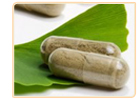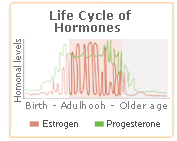Ginkgo Biloba Benefits
 Menopause brings with it a number of symptoms such as poor memory performance and circulatory disorders. Because of its beneficial effects in relieving these symptoms, more women are using Ginkgo biloba. Health experts support this because Ginkgo is also a reasonably safe and cost-effective remedy. Today Ginkgo is a popular herbal medication in both the US and Europe. Menopause brings with it a number of symptoms such as poor memory performance and circulatory disorders. Because of its beneficial effects in relieving these symptoms, more women are using Ginkgo biloba. Health experts support this because Ginkgo is also a reasonably safe and cost-effective remedy. Today Ginkgo is a popular herbal medication in both the US and Europe.
Gingko biloba�s health benefits are explained in more detail below.
Overall Health Benefits
Most of the benefits of Ginkgo biloba are related to its ability to improve circulation. Ginkgo biloba works by reducing the number of free radicals in the body. Free radicals are reactive substances that damage organs and tissues and can cause premature aging. Because it can reduce the number of free radicals, Ginkgo biloba improves blood flow to the brain and nourishes brain cells. It can therefore be used to relieve vascular disease and ease some of the symptoms of menopause, such as memory lapses.
Ginkgo is a popular plant extract for relieving the symptoms of menopause. Known as a brain stimulant, Ginkgo can help improve memory capacity, support cognitive function, and boost concentration. Furthermore, menopausal women can benefit from the increase in strength and energy levels that result from taking Ginkgo biloba.
Gingko has the following circulatory benefits:
. Enhances capillary circulation
. Strong antioxidant effects
. Thins the blood
. Increases blood flow to major organs such as the heart and brain
. Prevents the formation of blood clots
. Slows retinal deterioration by increasing blood flow to the retina
. Relieves leg pain resulting from intermittent claudication (a condition where fatty substances build up in the artery walls causing numbness and fatigue)
In addition to these cognitive and circulatory improvements, Ginkgo biloba benefits women looking for relief from other ailments related to menopause. Please read on to find out more about these.
Specific Benefits Related to some Ailments
 Hormonal problems: Female consumption of Gingko is common because more women are looking for an alternative to hormone replacement therapy (HRT). HRT produces many undesirable side effects such as nausea, breast tenderness, and weight gain, and can, although rare, lead to more serious conditions such as colon cancer. Numerous studies show that Ginkgo biloba has estrogenic activity and is a suitable alternative to HRT. Hormonal problems: Female consumption of Gingko is common because more women are looking for an alternative to hormone replacement therapy (HRT). HRT produces many undesirable side effects such as nausea, breast tenderness, and weight gain, and can, although rare, lead to more serious conditions such as colon cancer. Numerous studies show that Ginkgo biloba has estrogenic activity and is a suitable alternative to HRT.
The Ginkgo biloba herb can help increase estrogen levels in menopausal women. Because Ginkgo contains phytoestrogens, plant chemicals which act in a similar way to estrogen, it raises hormone levels by replacing human hormones with plant substitutes.
However, many health experts believe that non-estrogenic herbs are safer because they encourage the body�s own production of hormones and do not introduce external hormones into the body. Also, they do not have the side effects associated with Ginkgo biloba and other phytoestrogenic herbs.
Alzheimer�s: Because of Ginkgo biloba�s ability to boost blood flow, it is used to alleviate the symptoms of early-stage Alzheimer�s and dementia. Studies have shown that Gingko can delay deterioration and help sufferers maintain a more normal lifestyle.
Osteoporosis: Some studies report that because Ginkgo biloba extract (GBE) can slow down the aging process, it can help alleviate the symptoms of osteoporosis.
Multiple Sclerosis: Ginkgo biloba works by increasing energy levels, strength, and enhancing the mood of sufferers.
Circulatory problems: Ginkgo is a valuable herb for treating a wide range of circulatory disorders related to menopause. These include Reynaud�s disease, intermittent claudication, vertigo, tinnitus, disorientation, headaches, depression, confusion, poor mood, absent-mindedness, fatigue, headache, dizziness, and anxiety.
 Macular degeneration: Improving blood flow can help prevent age-related macular degeneration, a major cause of blindness. Macular degeneration: Improving blood flow can help prevent age-related macular degeneration, a major cause of blindness.
Sexual dysfunction: During menopause women�s sexual desires can fluctuate and reduce. Numerous studies indicate that Ginkgo biloba has a positive effect on women experiencing a loss of libido by increasing sex drive.
Sleep disturbances: Menopausal women often suffer from anxiety and forgetfulness and this can impact on their sleeping patterns. Because of its ability to relieve anxiety, Ginkgo can help correct sleep disturbances.
Despite its benefits, Ginkgo biloba can have side effects. Click the following link and read the next section to find out more about the side effects of Ginkgo.
Conclusion about Ginkgo biloba
Memory performance and improved circulation are the main benefits for menopausal women taking Ginkgo. Therefore, its effects are both physical and emotional.
However, because Ginkgo contains phytoestrogens and raises hormone levels by replacing human hormones with plant substitutes it is often criticized. Many health professionals believe that non-estrogenic herbs are safer because they encourage the body�s own production of hormones and do not introduce external hormones into the body and do not have the side effects associated with Ginkgo biloba and other phytoestrogenic herbs.
Which herb should women try? Today women are looking for relief from their menopause symptoms with herbs. Phytoestrogenic herbs and non-estrogenic herbs are good in relieving menopause symptoms, but recent studies show that non-estrogenic herbs have no side effects because they help the body to produce its own hormones instead of introducing hormones like the phytoestrogenic ones. Learn more about non-estrogenic herbs for menopause.
| 

